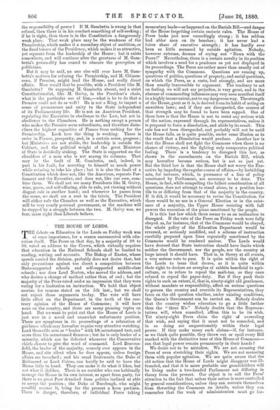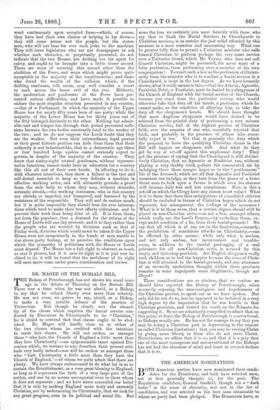THE HOUSE OF LORDS.
THE debate on Education in the Lords on Friday week was of some importance, for a maser) unconnected with edu- cation itself. The Peers on that day, by a majority of 98 to 50, voted an address to the Crown, which virtually requires that education in the National Schools shall be limited to reading, writing, and accounts. The Bishop of Exeter, whose speech carried the division, probably does not desire that, but only precautions against too direct a competition between State-supported schools and self-supported middle-class schools ; nor does Lord Norton, who moved the address, and who desires a change of method rather than of end ; but the majority of the Peers voted under an impression that they were voting for a limitation on instruction. We hold that object unwise, for reasons stated on the 5th inst., but we shall not repeat those arguments to-day. The vote will have little effect on the Department, in the teeth of the con- trary opinion of the House of Coriamons ; it will have none on the country, and there are many pressing topics on hand. But we want to point out that the House of Lords is just now in a novel and somewhat unfortunate position. There are symptoms in its proceedings of a relaxation of guidance which may hereafter require very attentive watching. Lord Granville acts as " leader " with Ms accustomed tact, and more than his accustomed firmness ; but he is only leader of a minority, which can be defeated whenever the Conservative chiefs choose to give the word of command. Lord Beacons- field, the leader of the majority, scarcely ever appears in the House, and sits silent when he does appear, unless foreign affairs are broached ; and his usual lieutenants, the Duke of Richmond or Lord Cairns, can hardly be said to have the House fully in hand. They can make it do what it likes, but not what it dislikes.. There is no outsider who can habitually manage the House in its own interest, as apart from party, for there is no great Peer detached from politics inclined or able to accept the position ; the Duke of Buccleugh, who might possibly assume it, being for the present a keen partisan. There is danger, therefore, of individual Peers taking
momentary leads—as happened on the Burials Bill—and danger of the House forgetting certain esoteric rules. The House of Peers looks just now exceedingly strong ; it has seldom had abler men on its benches ; it has never had a fairer share of executive strength ; it has hardly ever been so little menaced by outside agitation. Nobody, however extreme, dreams of crying out "Down with the Peers !" Nevertheless, there is a certain novelty in its position which involves a need for a prudence as yet not displayed in its proceedings. The Peers are rather more than usually out of sympathy with the Commons. Questions are coming up, questions of politics, questions of property, and social questions, on which the Peers, as a caste, feel strongly, and are more than usually inaccessible to argument. The tendency to act on feeling, we will not say prejudice, is very great, and in the absence of commanding influences may very soon manifest itself in a highly inconvenient, not to say dangerous way. The strength of the House, great as it is, is derived from its habit of acting on unwritten laws; and if they are disregarded, the sources of that strength may be found to have been sapped. One of these laws is that the House is not to resist any serious wish of the nation, expressed through its representatives, unless it is prepared to force a dissolution, and abide by its result. This rule has not been disregarded, and probably will not be until the House falls, as is quite possible, under some illusion as to the result that a Dissolution would produce. Another law is that the House shall not fight the Commons when there is no chance of victory, and the fighting only exasperates political feeling. There is a tendency to disregard this law, as shown in the amendments on the Burials Bill, which may hereafter become serious, but is not so just yet. But the third law is that the House shall not worry the Exe- cutive by impeding the regular course of affairs,—by forbidding acts, for instance, which, in pursuance of a line of policy sanctioned by Parliament, are necessary to be done. The House, in fact, while compelling the fullest consideration of all questions, does not attempt to stand alone, in a position hos- tile to or differing from that of the majority in the country. If it did, it would be necessary to revise the Constitution, for there would be no use in a General Election or in the exist- ence of a majority, the Upper House resisting with full powers the execution of the plans sanctioned by the people. It is this last law which there seems to us an inclination to disregard. If the vote of the Peers on Friday week were fully obeyed, as, for instance, that of the Commons would be obeyed, the whole policy of the Education Department would be reversed, or seriously modified, and a scheme of instruction carefully prepared upon lines repeatedly sanctioned by the Commons would be rendered useless. The Lords would have decreed that State instruction should have limits which neither the Government, nor the people, nor the country at large intend it should havp. That is, in theory at all events, a very serious vote to pass. It is quite within the right of the Lords to issue that decree, as it is quite within their right to declare an overplus of rabbits beneficial to agri- culture, or to refuse to repeal the malt-tax, as they once refused to repeal the paper-duty. But if they push their rights to such an extent, if, that is, ninety-eight old gentlemen, without mandate or responsibility, affect on serious questions to govern the country and override its Representatives, they force on the old question whether, under existing conditions, the Queen's Government can be carried on. Nobody doubts that the country wishes education to go a little farther than the " three R's." Nobody doubts that the Represen- tatives will, when consulted, affirm this to be its wish. Yet ninety-eight Peers claim the right of overruling that wish, and saying that it must not be conceded, and in so doing are unquestionably within their legal power. If they make many such claims—if, for instance, as we think quite possible, they throw out or spoil every Bill marked with the distinctive tone of this House of Commons— can that legal power remain permanently in their hands ?
We desire not to be mistaken. We are not accusing the Peers of even stretching their rights. We are not menacing them with popular agitation. We are quite aware that the old notion that the House of Lords might disappear was ill- founded, and that it is more probable our grandchildren will be living under a two-headed Parliament not differing in theory from the present. Our object is to call the Peers' attention to the fact that unless their action is more controlled by general considerations, unless they can restrain themselves from thwarting the Commons on details, unless they can remember that the work of administration must go for- ward continuously upon accepted lines—which, of course, they have had their own chance of helping to lay down— they will come across not the people, but the states- men, who will not bear for ever such jerks to the machine. They will force legislators who are not demagogues to ask whether such obstacles, so perpetually presented, do not indicate that the two Houses are drifting too far apart for safety, and ought to be brought into a little closer accord. There are ways of securing this accord other than the abolition of the Peers, and ways which might prove quite acceptable to the majority of the constituencies ; and those who dread the results of the collision which, if the drifting continues, will occur, may well consider a resort to such means the lesser evil of the two. Hitherto, the moderation and good-sense of the Peers have pre- vented serious difficulties, and have made it possible to endure the most singular situation presented in any country, —that of a Parliament in which the majority of the Upper House has for nearly fifty years been of one party, while the majority of the Lower House has for thirty years out of the fifty belonged distinctly to the other. Nothing but admir- able tact and temper has through that period prevented colli- sions between the two bodies necessarily fatal to the weaker of the two ; and we do not suppose the Lords doubt that they are the weaker. Not even their extraordinary legal powers or their great historic position can hide from them that their authority is not indestructible, that in a democratic age three or four hundred large squires cannot seriously expect to govern, in despite of the majority of the country. They know that ninety-eight estated gentlemen, without represen- tative functions, cannot make laws on education for a country like this all out of their own heads. In affecting to do it, with whatever intentions, they show a failure in the tact and self-denial essential to keep so very delicate a machine in effective working order, and will ultimately provoke a growl from the only body to whom they may, without discredit, seriously attend,—the working statesmen, who in this country are already so impeded, and hampered, and harassed by the resistance of the responsible. They will and do endure much, but it is quite impossible they should bear for ever interrup- tions which tend to make their best efforts ridiculous, and to prevent their work from being done at all. It is from them, not from the populace, that a demand for the reform of the House of Lords will one day proceed; and it is they rather than the people who are worried by divisions such as that of Friday week, divisions which would never be taken if the Upper House were not momentarily in the hands of men unable to rise above party feeling, or to perceive the conditions upon which the sympathy of politicians with the House of Lords must depend. The House has a full right to obstruct as much as ever it pleases, but if it uses its right as it is just now in- clined to do, it will be found that the usefulness of its right will once more come under grave consideration and review.



































 Previous page
Previous page